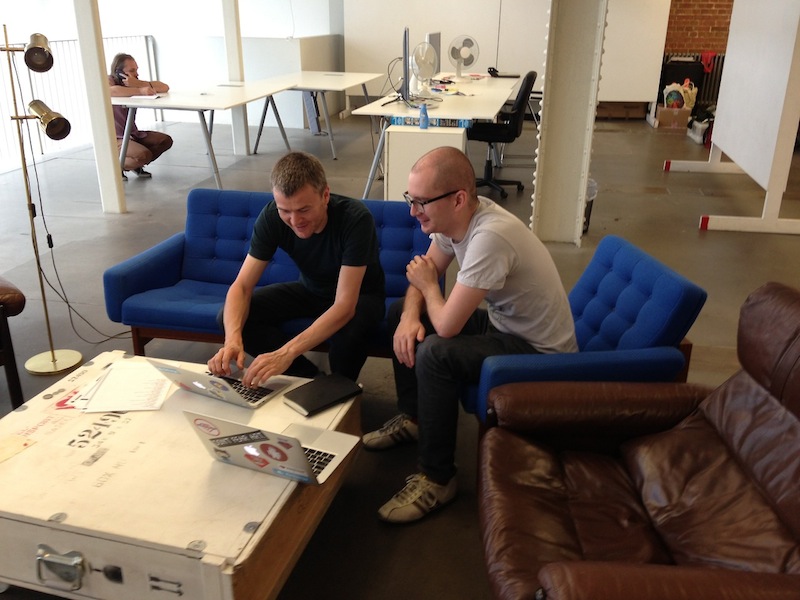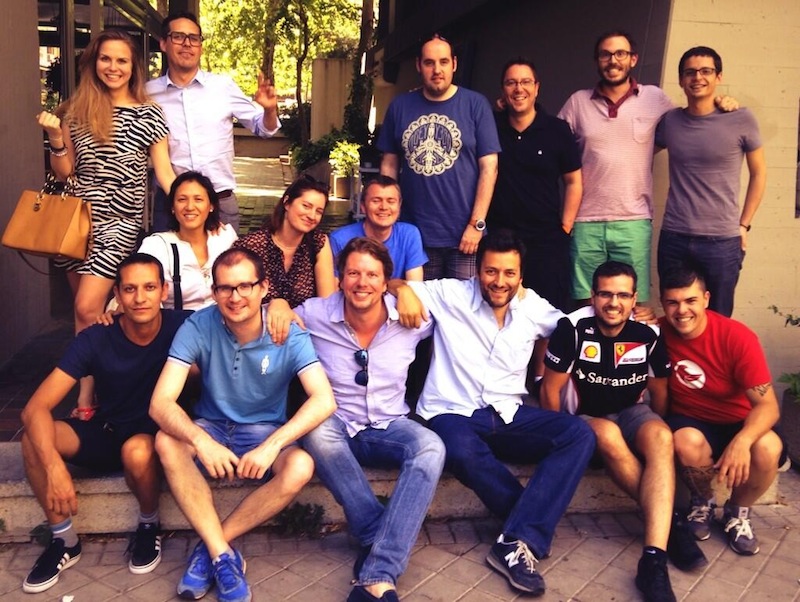Name: Jorge Gómez Sancha
Title: Founder and Managing Director
Company: BeBanjo
Based in: Madrid, Spain
Established: 2008

What does BeBanjo do?
We build software for the video-on-demand industry. Basically, a video-on-demand service is something like Netflix. All of the operations that need to take place — from the moment that Netflix acquires content from the Hollywood studios, for instance, until that content is available for a user to watch — all those operations can be managed and tracked with our tools.
How many people work for the company, and of those, how many work remotely?
It goes up and down, but right now, around 16 people. Pretty much everyone works remotely in some fashion or other, but only two people, including myself, go consistently to the office. Some of them have an office to go to if they want; some don’t have an office in the city they’re working from. The main offices are in Madrid and in London. There are also people in the North and South of Spain. They can come to Madrid but they don’t regularly.

Why did you make the decision to go remote?
From the beginning, we realized we didn’t want to limit ourselves to working with local people. Also, we wanted it to be an international company because most of our customers, we knew, would likely be outside of Spain, which is the case. We only have one customer in Spain; the rest are all in the UK, France, the U.S., various countries. We made a point of making sure everyone felt OK with working remotely and very soon we were hiring foreign people.
My cofounder is Dutch. He was living in Madrid as well. Our language was always English; every communication is English. So it’s been in our DNA from the beginning, working remotely and being an international company.
What tools do you use to collaborate remotely?
For our code repositories for our software we use GitHub. For communications or for chat we use Campfire — we always have a Campfire room open. We use Basecamp when we work with customers. We use an internally built tool, a digital kanban board, to have a place where anyone can look and see exactly what development stage each feature is in. That’s become the heart of our day-to-day. All our infrastructure is virtual, so we use Amazon web services. There are no physical servers or anything, just our laptops.
What challenges did you face in setting up as a remote company?
One thing we realized very quickly is that not everybody is cut out to work remotely. It became obvious that we needed to find self-motivated, responsible, professional guys who like what they do, and it’s not a problem for them to sit in front of their computers at home. There’s no easy way to micromanage someone remotely, and we didn’t want to. We wanted to work with guys who would raise the bar. We find that good, self-motivated, responsible guys are also perfectly capable and willing to work remotely as well. Maybe not everyone we worked with initially was perfectly suited for that. Soon that stopped being a problem because everybody we hired was aware that this was the case.
Working remotely also requires an extra effort in terms of communication. If someone is sitting in the office, I pretty much know what he’s doing. If we’re not in the same office, I sometimes lose track. It requires them to be proactive in providing information. The same goes for me — if I don’t communicate, then no one knows what’s going on with me, whether we’re signing new customers or things like that.
What do you think are the major benefits of being remote for your team?
They feel like grown-ups, if you know what I mean. Normally in Spain, people are used to working a specific number of hours and being watched in terms of what time you come in, what time you leave. For us, the focus has always been: what can you do? What are you giving back? That’s the agreement. You do whatever you need to do — you want to wake up at noon, and start working then? Fine with us, but why are you doing this — does it make you more productive? Basically, people get more and more responsible with their time, because they are given a vote of confidence, and they return that greatly. That’s something people appreciate a lot, being treated as a grown-up.
I don’t even count vacation days or how many hours you work. I expect you to do what you need to do and be responsible, and the moment you aren’t, it’s immediately obvious to everybody. If you’re doing your work, it’s clear to everybody. If you’re not, then it’s also clear — even working remotely, just by the output. That’s one big benefit. They know they’re hired because they’re experts at what they do and they’re not treated like children.
That doesn’t mean that everybody’s left on their own and no one cares about them. We are very conscious about how people are feeling, whether they’re happy or frustrated. We make it a point to manage that. But no one cares about times, vacations, things like that. And people are super responsible in general.
Any advice for other companies who are considering going remote?
If you find the right people, it’s incredibly easy to do. Start with the people you think can manage it — who are responsible, self-motivated, enthusiastic about their work and so on. And also try with the people who request it — they will make a bigger effort to make this work than anyone else, because it’s in their interest.

Another thing is to communicate a lot — try to get in the habit of writing an email every other week or so sharing what’s going on, whether you’re the boss or whether you are just a guy working there. It’s super interesting to everybody to know what’s going on in the company, and just generate a sense of community and team. That is hugely important.
Find a place where people can go to virtually and feel they’re being seen as well. Although people are comfortable working remotely, maybe you’re hacking away at your software for hours, and you’re not talking to anybody because you’re concentrating. People start feeling anxious: “they’re going to be thinking that I’m not doing anything,” when actually they are working very hard. It’s important they have somewhere they can go to get rid of that stress factor, like a chatroom or something they can check into and say “I’m around if you need me; I’m just busy doing something else.” It’s a detail, but we’ve seen that helps.
It should be a big incentive for any company to get into working remotely: good people, good developers, good designers — they are all over the world. They are not just in your local town. Working remotely — opening the door to doing that — just opens the door to finding great people all over the place. If you’re used to working remotely and it’s easy to bring people onboard because everybody works like that, you’ll be able to hire anyone if your project is interesting and you pay good money. This kind of work is attractive to the sort of people you might be looking for: self-motivated, intelligent, and active people are attracted to this way of working.
Visit BeBanjo.

Michael Jones
on 14 Oct 13Another example of a small company who had success on that transition, but AGAIN, they are only 16 people. So, remote work is definately another talk when comparing with company with a thousands of workers.
Well I know the objective of this article is to promote 37signals new book. But what it is annoying me, is that 37Signals always talks about remote but when was time to hire the iOS developer they chose one to work locally.
Glenn Meder
on 14 Oct 13My question is regarding the hiring laws of hiring people in different countries. How does this work? What added level of complication is involved? I do everything that I can to work with independent contractors because i don’t want to deal with the laws regarding employees, even within the States, much less internationally. I’d like to hear your perspective on this. Thanks.
Emily
on 14 Oct 13@ Michael, I’m sorry you’re annoyed. It’s probably true that it’s easier for smaller companies to get started with remote work, but larger employers (and smaller departments within large companies) - such as American Fidelity Assurance Company and Herman Miller, both of whom we spoke with for the book - find it works for them too. We fully acknowledge that it isn’t for every company, and that it doesn’t work for every position at every company: for example, our video guy comes to the office nearly every day because that where his bulky, expensive equipment lives. We know it’s not the answer for everyone—it’s just something we’d like to see more companies consider as a possibility, which is what the book and these posts are about.
@ Glenn, it can certainly require a little research—there’s a chapter in REMOTE that deals with that very question, so stay tuned! :) At 37signals, we treat all non-U.S. workers as contractors, yet do our best to offer as many similar benefits to full-time employees as possible.
Michael Jones
on 15 Oct 13@Emily: That was a good answer. And sorry if I was too harsh that was not my intention since you did a great interview.
Well, I’ll wait for the book to see those examples that you said before posting again.
Matt Boyd
on 15 Oct 13This is an awesome post and such a cool feature of a great company that’s doing it the right way. I loved their thoughts on treating the team like adults because they are. I do believe that people tend to manage themselves and if you work with self-motivated and smart people then working remote does become less of a challenge. People do actually care, contrary to some beliefs.
I think it all comes down to trust. Remote working does require some level of trust and building that trust doesn’t come easy but with the right tools and proper perspective, that trust can be built naturally. I really enjoyed this post.
Glenn Meder
on 15 Oct 13Thanks for the thoughtful responses. I’m glad to hear about your practice of considering them contractors. It makes a lot of sense that way.
Donna Duncan
on 17 Oct 13Just wondering how geographically disbursed everyone is, and if finding joint meeting times is a problem caused by differing time zones? I’d also like to know if all your workers are heads-down or if some are client-facing. I think that makes a big difference to how successful your model can be as well.
Good article though. Refreshing and made me smile to hear about a company that has made remote workers work so well. Shows a lot of maturity I think, both on the individuals and the company. Loved the visuals too!
Anonymous
on 17 Oct 13Good One
j
on 20 Oct 13BBVA, the 2nd bank in Spain and the 1st in many markets, is doing a great job on teleworking / remote working, you should take a look at it ;)
This discussion is closed.